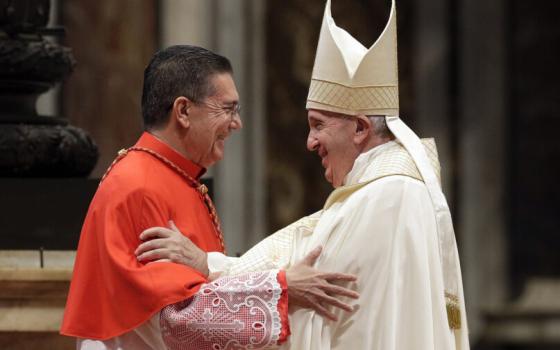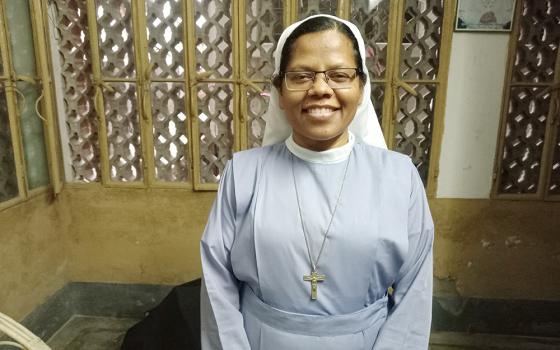My colleague John Allen reported yesterday on the fact that the Holy Father baptized the child of a couple who had contracted a civil marriage. And, as Allen notes, this is a pretty stunning development, one that, as I see it, entails several key issues of increasing depth and significance.
First, there is the strange canonical situation of Catholics who do not marry in the Church. Those marriages are not only considered illicit, but invalid. This has never made sense to me. We presume that a Jewish couple that is married, civilly or in the synagogue, have a valid marriage, and that an atheist couple that marries, presumably in a court room, have a valid marriage, but when a couple of RCs get married any place but in the Church, that is not valid.
The issue was one of the most contentious at the Council of Trent and, if memory serves, was the last issue standing in the final session of that all-important Council. The Fathers of Trent were concerned about a circumstance that no longer exists, clandestine marriages. Even as conservative a canonist as Ed Peters has allowed that the Church should reconsider this norm. Pope Francis did not indicate such a reconsideration was in the offing, but I should not be surprised if this issue comes up at the forthcoming Synod on the Family.
A deeper issue is the didactic nature of pastoral ministry. Critics of the pope’s act, or of similar situations, will criticize him for weakening an appreciation for the Church’s own rules regarding civil marriage. Did he? I remember an observation of Cardinal Francis George in his book, “The Difference God makes,” that in a Catholic culture, many things are not permitted but everything can be forgiven. Conversely, in modern, liberal American culture, everything is permitted and some things are deemed unforgivable. Navigating this difference is not easy. People need ideals for which to strive. They need norms to guide their appetites and channel the wisdom of previous generations.
The Church should be unafraid in preaching those truths of our faith that we believe are revealed by God. And, we should be unapologetic about those beliefs. But, the “enforcer” approach to the rules weakens an appreciation for a more fundamental Catholic belief than anything devised at Trent: It weakens our appreciation for the fact, held in faith, that God’s mercy and love are superabundant. A pastor cannot, repeat cannot, preach this cardinal truth of our faith while wagging his finger, still less with pursed lips, through which come canonical assertions.
There is a still deeper issue. When our pastors keep themselves busy enforcing fine-tuned rules, we invite a contractual understanding of grace. As Allen notes, the people of God have a right to the sacraments, which is true in one sense but woefully wrong-headed in another. Vis-à-vis a minister of the sacraments, yes, the people of God have a right to them. No priest can deny baptism or communion to someone because he does not like them. But, no one has a right to grace vis-à-vis God. Grace is God’s freely given gift to us and, in the normal life of God’s faithful people, the sacraments are the principal means of conferring grace. We talk a lot about the symbolism of baptism, the water, the candle, the holy oil, but when a priests pours that water on that baby’s head and pronounces the baptismal formula, something greater than symbolism occurs. That baby IS baptized. When the priest speaks the words of consecration, that bread and that wine IS transformed into the Body and Blood of Christ. These sacraments are as real as the laptop I am typing on at this second. I think this sense of the reality of grace has been lost in recent years.
Which leads to the deepest issue. It is not so much that we have a right to the sacraments as that we have need of them. We need God’s grace. When Pope Francis said, “I am sinner,” this was no throwaway line. Neither did this acknowledgement of his own sinfulness seem to overwhelm him. None of us, Pope Francis included, could feel anything but overwhelmed by our sins when standing before God. Think of all the blessings we have received, yet we dare to sin. Can’t even help ourselves. We learn to like our sins, even to cherish them, shielding them from God’s impassive gaze (of course, it is not impassive but we can make it seem that way), we rationalize our sins, we grow quick to forgive ourselves no matter how reluctant we are to forgive others. This is our human nature and, when we are honest, we know it. We should feel overwhelmed by our sins when we stand alone before God.
But, we do not stand alone before God. We have been justified by Jesus Christ and stand with Him. He makes intercession for us. In one of my favorite arias in Handel’s Messiah, the soprano sings, “If God be for us, who can be against us? Who shall lay anything to the charge of God's elect? It is God that justifieth, who is he that condemneth? It is Christ that died, yea rather, that is risen again, who is at the right hand of God, who makes intercession for us.” (Romans 8:31,33-34) Pope Francis probably knows this great piece of music, but whether he does or not, clearly he knows the scriptural passage and is trying to make it effective again in the life of the Church.
This is what has been lost in the culture wars – an appreciation for the fact that God’s superabundant grace has been made available to us by Christ and is offered to us in the sacraments. When we are busy fighting about the rules, we lose sight of this foundational teaching of the Church. Pope Francis did not weaken anything the other day when he baptized that child of a civilly married couple. Instead, hopefully, that couple came away realizing that no one has greater need of God’s grace than a newly married couple and perhaps they should, now, get married in the Church too. By not “enforcing” any rule, by making God’s grace available to their child, by reaching out with open arms rather than a clenched fist, Pope Francis did more to teach us all about the sacrament of baptism and the sacrament of marriage than any sermon I have heard in many years. He reminded us that God’s superabundant mercy is greater than any of our sins, His love is greater than any of our troubles, and that if the Church is to be truly the Church of Jesus Christ, this “rule” of grace trumps all others in the pastoral care of the flock entrusted to the Church.



